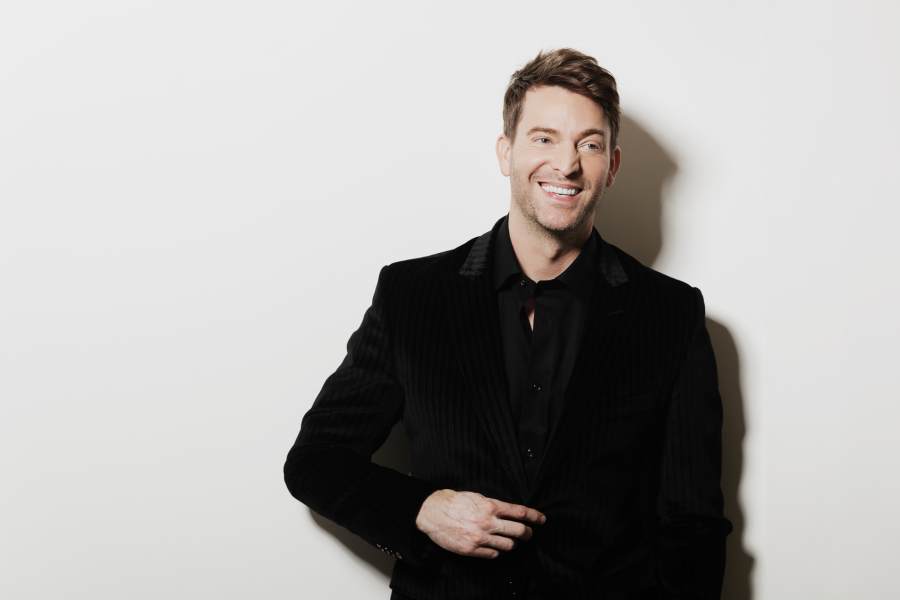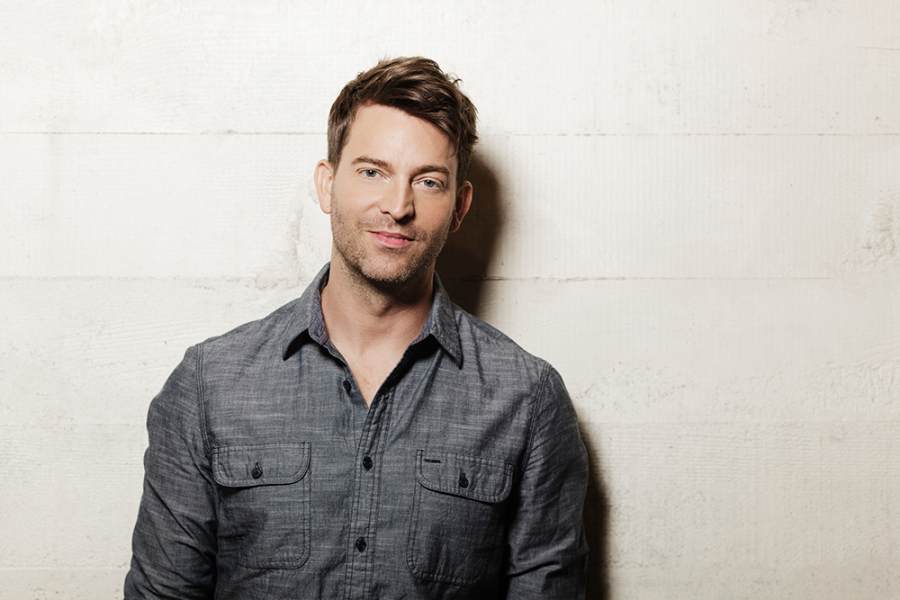

Tony winner Levi Kreis is back with Broadway at the Keys a new album featuring some of his favorite showtunes done in jazzy, intimate arrangements. Kreis turns big, brassy songs like “Friend Like Me” from Aladdin into soulful takes that wouldn’t be out of a place in a classic jazz album, he infuses “Not While I’m Around” from Sweeney Todd with sigh-inducing longing, and breathes new life into the epic “Wind Beneath My Wings.” Kreis’ voice has never sounded better, and the sober, timeless beauty of the orchestrations in the album should make it a favorite of Broadway fans, as well as an appetizer while we wait for Levi’s return to the NY stage. We spoke to him about selecting the songs for the album, connecting to the music he sings, and why he prefers to work in new shows.
It seems you’re returning to your origins by doing a piano album. What drew you to this simple approach again?
It’s been a while since my debut album in 2005, all those years of living in NYC, the dating, the boys I was exploring, made it a very special album. I wanted to capture that same very intimate, vulnerable vibe that’s become really a lot of my fans’ favorite album. I love that you caught that, that’s cool.
How do you go about putting together a satisfying selection of showtunes for an album? There must be so many you had to leave out.
It can be pretty daunting, there is so much great material out there. One of the things that informed my decision was I wanted to do songs that were really inspiring to me personally. I’m a perpetual dreamer and no matter how much the opportunity and blessing to experience life I always tend to want to dream again, dream bigger. I was really attracted to songs like “Corner of the Sky” or “Neverland”, songs that I know when you strip them down into a very intimate setting like that you’ll be able to whisper them in your ear. I wanted to be able to whisper in your ear and say “Jose, don’t stop dreaming, don’t stop believing in what you can offer the world because it’s unique and we need your individual voice.” Other songs are just a part of my repertoire onstage, but for most part I’m trying to deliver a message that will inspire others. I’m lucky enough that the body of work I’ve ended up with has done that pretty well.
When you’re doing a concert and you include one of your compositions among the songs by people like Stephen Schwartz or Stephen Sondheim, do you feel intimidated?
I’ve never thought about it that way before, maybe I should start panicking (laughs) I’ve been performing these songs for a while, I go with material on the road before I release it. What I really try to do in the live show is tell stories, I’m from a small town in East Tennessee, so a lot of my life stories are rather unconventional and humorous. They flow well from one song to the other, when I do material that doesn’t come from my own life experiences, I think it’s my responsibility to tell it in a way no one else has told it in before. I listen to “Lost in the Wilderness” from Children of Eden and that to me, and what I’m going through now, means something specific. I think it’s all about staying with that willingness to be exposed, to bring the vulnerability I bring to my own songs, to the music someone else wrote. I hope that approach makes everything blend smoothly together.
I got little goosebumps when I realized there’s a segue from “Anytime (I Am There)” into “Neverland.” I’d love to hear about how the order of the songs is also telling a story.
Nothing gets past you (laughs) I really did try to curate the order of songs as I would do them live. As I listen to the album in my mind I’m moving from story to story in my own life. There was a very specific reason why “Lost in the Wilderness” began the way it began, my story of growing up in this fundamentalist Baptist world that I didn’t make, and how my job was to set out of the Garden of Eden and find the truth of who I am as an individual, as an artistic person, a gay man, all of these things that didn’t fit into the world I was born into. I hope that as it goes the experience moves from lost to found, which is why in “Living in the Shadows” I want to touch on that feeling of fumbling as we discover ourselves, and how we reach that moment in time where we can say “I’m here to be me and I’m here to be me unapologetically.”
I love Aladdin and when I think about “Friend Like Me” I think about it as this huge number with dancers, acrobats, jewels etc.
That’s really the funnest way to think about it.
I was very pleased to realize that the song as you do it in your album works both as a big band New Orleans number, but also in this low-key Louis Armstrong style. How did you choose what kind of arrangement you’d use for each song?
I love that, I love your references, I guess based on my looks I’ve been compared to Harry Connick Jr. since I was 21 years old, I grew up with his music and he’s been a big influence for me including a lot of that New Orleans piano interpretation. He did “Bear Necessities” and it was so interesting, because I grew up listening to that kind of New Orleans sound I’m always able to catch what song is able to do that. The first thing I think of is can I make this swampy and Southern? I knew I wanted that kind of treatment for “Friend Like Me,” I think it stays true to the song but also to the elements that stretch it into that idiom.

But then there’s something like a Sondheim piano and you probably don’t change that around right?
That’s true, the liberties I took with my “Not While I’m Around” are so subtle, there’s a sovereignty with his music.That subtle jazz slant to the song happened while I was playing the song on the road for about eight months, it happened without me realizing it. There was a sultriness that was beginning to happen, this touch of confidence “no one’s gonna touch you, I’ve got you.” It happened to me, I can’t get credit for anything that happened, the story began to tell me rather than the other way around.
If your album had come out a couple of decades ago, snobs would’ve complained about how many movie-to-Broadway songs it has. Why was it important for you to acknowledge all the movie musicals?
I’ve always celebrated the songwriter first and foremost, I wrote my first song when I was 12 years old, I had a top ten hit as a songwriter with a Grammy nominated group. I loved songwriting before I knew I loved acting, film or stage. To me it’s sorta like we say in the South “six of one and half a dozen of the other,” if it’s a great song I don’t care where it comes from.
I’ve always celebrated the songwriter first and foremost Click To TweetYou were in Frailty, I’m sure you were as shocked by Bill Paxton’s death as we all were. Can you share some memories of working with him?
Oh gosh, Bill Paxton got me so new and green behind the ears, I was such a baby in 2001. In my first audition ever, I landed the role of Roger in the national tour of Rent, in my second audition I got the lead in an indie that won some awards in festivals, my third audition was for Bill Paxton in Frailty. It was my first major motion picture, I didn’t have a big resume, I was paralyzed by fear, I didn’t know how I’d gotten to be sitting next to Matthew McConaughey on a screen test at the Paramount Studios lot. The experience was a few weeks long, we shot more than ended in the film, it was edited greatly, a lot of my scenes with Matthew were redundant, so selfishly I would’ve loved more screen time, but the way the film was cut was great. I’ll never forget my first time stepping into the set, Bill came to me, he could see right through me, he saw I was like a trembling little fawn, he put his hands on my shoulders, he’s like three inches from my face and he says “listen, you’ve got this, I’m here to help you, we’re going to do this together.” He was so humble, he wasn’t cynical in the same way many of us are in this business going from project to project over everybody. He was loving, he was a present, everloving man. Years later he came to see me in Million Dollar Quartet, he just wanted to come see me because he was proud of what I had done. He remembered me and was thoughtful enough to come see me. It was tragic to think about him passing, in the industry you don’t often meet people as genuine as him.
So what’s it gonna take to have you back on Broadway?
It’ll take the right role. It’s the number one goal for me right now, with so many great new projects coming through it looks like it will be sooner rather than later.
Are there any current shows you’d love to be a part of? You can always say Hamilton.
That’s true, but I’m really interested in the new stories coming down the pipeline. I’ve always been attracted to new work, I’m the guy who always ends in the workshops. I did a show called One Red Flower that moved from Seattle to Kennedy Center to NYC, it was going to be my Broadway debut, until the point where we had a theater lined up. It’s always fun to invest that much on the level of originating the characters. There’s a couple shows lining up in the shadows that I have my eye on.
I hope you’ll betray what you just said and let me know what’s on your Sondheim wishlist.
Definitely Sweeney Todd, once I get of age that’s exactly what I want to play!
Broadway at the Keys is now available in stores.